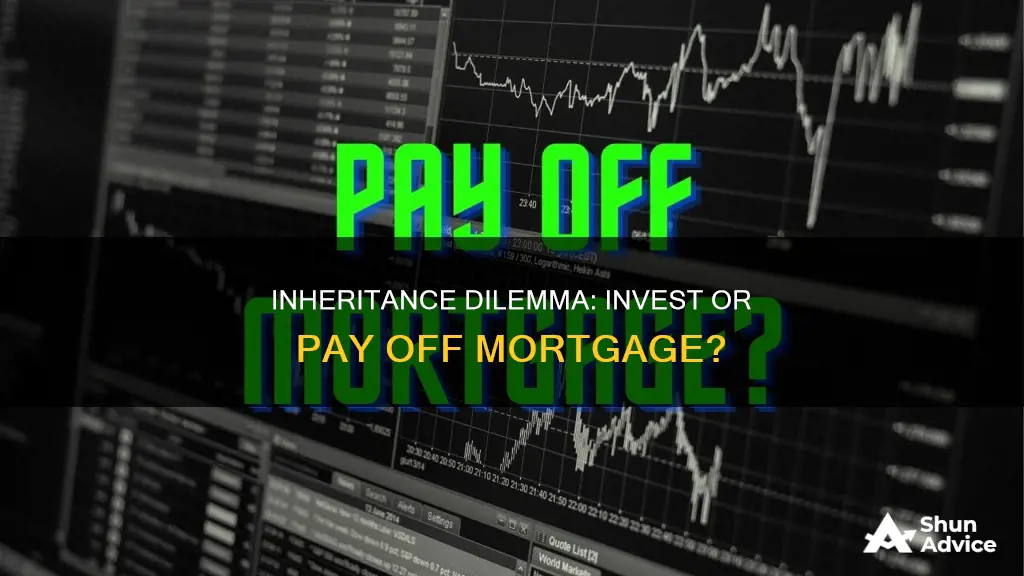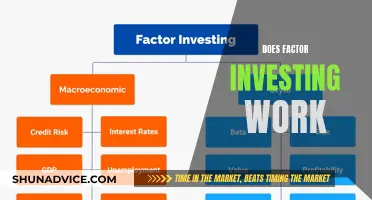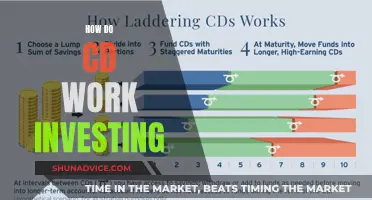
Whether to invest your inheritance or pay off your mortgage is a complex decision that depends on your financial situation and goals. While paying off your mortgage early can be tempting, it's important to consider the opportunity cost of investing that money elsewhere. On the other hand, investing comes with risks and may not provide the same guaranteed returns as paying off your mortgage. Let's explore the pros and cons of each option.
| Characteristics | Values |
|---|---|
| Pros of paying off mortgage | Save on interest, peace of mind, build equity, free up funds |
| Cons of paying off mortgage | Cut into savings, opportunity cost, wealth tied up, loss of tax breaks |
| Pros of investing | Higher returns, liquid investment, employer match, higher future wealth, better asset liquidity |
| Cons of investing | Higher risk, increased debt, investing is costly |
What You'll Learn
- Paying off your mortgage early saves you thousands in interest payments
- Investing your money can give you a higher rate of return than paying off your mortgage early
- Paying off your mortgage early means you miss out on tax deductions for mortgage interest
- Investing is riskier than paying off your mortgage, but it can also be more rewarding
- Consult a financial advisor before making any big decisions about your inheritance

Paying off your mortgage early saves you thousands in interest payments
Paying off your mortgage early can save you a lot of money in interest payments. Contributing just $50 extra a month can help you pay off your mortgage years ahead of schedule. Even a small extra monthly payment can allow you to own your home sooner.
Let's look at an example. Suppose you borrow $150,000 to buy a home at 6% interest with a 30-year term. By the time you pay off your loan, you'll have paid a whopping $173,757.28 in interest in addition to the $150,000 you initially borrowed. Now, let's say that you pay an extra $100 every month towards a loan with the exact same term, principal, and interest rate. At the end of the term, you'll have paid a total of $128,170.57 in interest. That's a saving of $45,586.71 compared to paying off the loan without making any extra payments.
The benefits of paying off your mortgage early include eliminating your monthly mortgage payment, freeing up extra funds, and offering peace of mind knowing that you own your home outright. However, paying off your mortgage early may not always be the best idea, even if you have the money. It's important to weigh the benefits against the potential opportunity cost of investing your money elsewhere.
For example, consider the potential returns from investing in the stock market or other financial instruments. Historically, the S&P 500 has returned an average of 10% over the last 90 years. This average return is higher than the interest rate on most mortgages. Therefore, investing your money instead of paying off your mortgage early could result in higher returns.
Additionally, paying off your mortgage early may tie up a significant portion of your liquidity and net worth in your home, making it harder to access cash in the future. It's important to have some liquid assets, such as an emergency fund, stocks, or mutual funds, that can be easily converted to cash if needed.
Another factor to consider is the opportunity cost of paying off your mortgage early. If you pay off your mortgage early, you may miss out on the opportunity to invest your money at a higher rate of return. This could result in a lower overall financial benefit compared to investing.
In conclusion, while paying off your mortgage early can save you thousands in interest payments, it's important to carefully consider your financial situation, the potential opportunity cost of investing, and the value you place on having peace of mind and being debt-free. Consulting with a financial advisor or planner can help you make an informed decision that aligns with your financial goals and risk tolerance.
Tomorrow's Investments: Where to Look
You may want to see also

Investing your money can give you a higher rate of return than paying off your mortgage early
The stock market has historically risen over the long term, and the returns can be significantly higher than the interest you'd save by paying off your mortgage early. For example, the S&P 500 has returned an average of 10% to 11% annually since its inception in 1926 through 2018. If you invest in stocks, bonds, and other market investments, you can also easily sell and access your money if you need to.
Additionally, if you're investing in a retirement account, you may be able to take advantage of an employer match. This means that your employer will match your contributions up to a certain percentage of your salary, giving you even more money to invest.
However, investing does come with higher risk. The stock market can be volatile, and you may gain or lose thousands of dollars. In contrast, paying off your mortgage early guarantees a return on your investment in the form of interest savings.
Ultimately, the decision to invest or pay off your mortgage early depends on your financial situation and risk tolerance. Consult a financial advisor to help you analyze your personal situation and goals.
Sphere 3D: A Risky Investment Move
You may want to see also

Paying off your mortgage early means you miss out on tax deductions for mortgage interest
Paying off your mortgage early generally means foregoing tax deductions for mortgage interest. Mortgage interest is tax-deductible if you itemize deductions on your income tax return. However, the standard deduction may be more beneficial for some taxpayers, especially with the recent increase in the standard deduction amount. For 2022, the standard deduction is $14,600 per person or $29,200 for a married couple, and it's even higher for those over the age of 65. Due to these increased standard deductions, many homeowners may opt to not itemize, resulting in a loss of the tax benefit associated with mortgage interest.
The tax benefit of mortgage interest is also dependent on the interest portion of your mortgage payment. In the early years of a mortgage, a large portion of the payments goes towards interest, making it mostly tax-deductible. However, as you get closer to paying off the mortgage, your payments consist mostly of the principal amount, which is non-deductible. Therefore, paying off your mortgage early means missing out on the opportunity to deduct a significant portion of your mortgage interest from your taxable income.
Additionally, it's important to consider the potential tax savings from the mortgage interest deduction versus the cost of the interest itself. In some cases, the cost of the interest may outweigh the tax savings. For example, if you have $15,000 in mortgage interest and are in the top 37% tax bracket, you would save $5,550 in federal income taxes. In this scenario, paying $15,000 in interest to save $5,550 may not be the most financially prudent decision.
Moreover, the decision to pay off your mortgage early or continue with the tax deduction depends on various factors, including your financial situation, risk tolerance, and investment opportunities. If you have the opportunity to invest your money at a higher rate of return than the interest rate on your mortgage, investing may be a more attractive option. This is because you could potentially earn more from your investments than the interest cost of your mortgage, even after considering the tax savings from the mortgage interest deduction.
In conclusion, while paying off your mortgage early can provide psychological benefits and reduce your overall interest cost, it's important to consider the opportunity cost of foregoing the tax deductions for mortgage interest. The decision should be made after carefully evaluating your financial circumstances, investment options, and the potential tax implications. Consulting a financial advisor or tax professional can help you make an informed decision that aligns with your goals and priorities.
S&P 500: Invest Now or Wait?
You may want to see also

Investing is riskier than paying off your mortgage, but it can also be more rewarding
While paying off your mortgage can be liberating, it's important to consider the opportunity cost of not investing that money instead. The stock market has historically provided higher returns than the average rate of a mortgage, so you could be missing out on potential gains by prioritising paying off your mortgage.
For example, let's say you have a 30-year mortgage of $200,000 with a fixed rate of 4.5%. Your monthly payments would be $1,013 (not including taxes and insurance), and you'd pay a total of $164,813 in interest over the life of the loan. Now, assume you're able to put an extra $300 per month towards your mortgage. You'd pay off your mortgage 11 years early and save $67,816 in interest.
On the other hand, if you invested that extra $300 per month in an index fund tracking the S&P 500, you could historically have seen average annual returns of around 10% to 11%. After 19 years (the time it would take to pay off your mortgage early), you'd have around $160,780—more than double your potential interest savings. Even if you decided to pay off your mortgage early after investing, you'd still have over $55,000 left over.
Additionally, investing offers higher liquidity than paying off your mortgage early. If you need cash quickly, selling stocks or similar investments is much easier than selling your home or attempting a cash-out refinance.
However, investing in the stock market is inherently riskier than paying off your mortgage. There is more volatility in the stock market than in the housing market, and you could potentially lose thousands of dollars. It's important to ensure your investment strategy matches your risk tolerance and that you're mentally prepared for potential losses.
Ultimately, the decision to invest or pay off your mortgage depends on your personal financial situation and risk tolerance. Consult a financial advisor to help you make the best decision for your circumstances.
Sherwin-Williams: Time to Invest?
You may want to see also

Consult a financial advisor before making any big decisions about your inheritance
Receiving an inheritance can be life-changing, and it's tempting to pay off your mortgage to become debt-free. However, it's crucial to consult a financial advisor before making any hasty decisions about your inheritance. Here are some reasons why:
Understanding the Bigger Picture:
Financial advisors take into account your entire financial situation, including your income, expenses, savings, investments, and debts. They can help you understand the implications of using your inheritance to pay off your mortgage in the context of your broader financial goals.
Exploring Options:
Paying off your mortgage might seem like the obvious choice, but a financial advisor can help you explore alternative options. They can guide you in evaluating the potential benefits of investing your inheritance in stocks, bonds, or other financial instruments. This could potentially provide higher returns over time compared to the interest saved by paying off your mortgage early.
Risk Assessment:
Investing comes with risks, and a financial advisor can help you understand and assess these risks. They can provide insights into the volatility of the stock market, the potential for gains or losses, and how different investment options align with your risk tolerance. This information is crucial for making an informed decision.
Tax Implications:
There are tax implications to consider when deciding between paying off your mortgage and investing. A financial advisor can explain the tax benefits of mortgage interest deductions and how they might impact your overall tax liability. They can also advise on the tax consequences of any investment gains or losses, helping you make a decision that minimizes taxes and maximizes your after-tax returns.
Retirement Planning:
Consulting a financial advisor can help ensure that you're making a decision about your inheritance that aligns with your retirement goals. They can advise on the benefits of starting to save for retirement early and the power of compound interest over time. Additionally, they can provide guidance on retirement account options, such as IRAs or 401(k)s, and the potential for employer matching contributions.
Peace of Mind:
Making a decision about what to do with your inheritance can be stressful. A financial advisor can provide peace of mind by offering personalized advice tailored to your unique circumstances. They can help you weigh the pros and cons of each option, ensuring that you make a well-informed decision that you're comfortable with.
While it's ultimately your decision, seeking the guidance of a financial advisor can help you navigate the complexities of this choice. They can provide valuable insights, ensuring that you make the most of your inheritance and set yourself up for financial success in the long run.
Rwanda's Education: Invest in the Future
You may want to see also
Frequently asked questions
Investing your inheritance in something like the stock market gives you the potential to earn more money than you would save by paying off your mortgage early. Stocks, bonds and similar investments are also more liquid than a mortgage, so you can sell them and make use of the money more easily.
Investing is riskier than paying off a mortgage. You could gain or lose thousands of dollars. Returns from investing are also not as safe and fixed as the returns from paying off a mortgage early.
Consult a financial advisor to discuss the best moves for your portfolio and financial goals.







